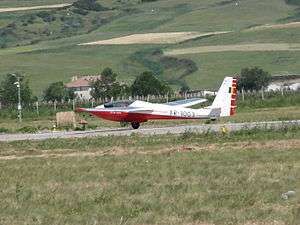ICA IAR-35
The ICA IAR-35 is a Romanian glider designed and built in the 1980s primarily for aerobatics, though capable of general purpose use. Several production prototypes were constructed.
| IAR-35 | |
|---|---|
 | |
| Role | aerobatic glider |
| National origin | Romania |
| Manufacturer | Inteprinderea de Constructii Aeronautice (ICA), Brașov |
| First flight | May 1986 |
| Number built | at least 4 |
Design and development
The IAR-35 is an all-metal, single seat, short span glider developed for aerobatic flight. Its three spar shoulder wing, with metal ribs and bonded metal skinning, has a constant chord centre section and tapered outer panels. There is no dihedral on the centre section but 2° outboard. The whole trailing edge is occupied by all-metal, statically balanced ailerons, each fitted with an automatic trim tab. DFS (Schempp-Hirth) airbrakes extend both above and below the wings.[1]
Its fuselage is a metal semi-monocoque with aluminium alloy framing and duralumin skin. The cockpit is ahead of the wing with the pilot under a long, single piece Perspex canopy. On the underside, below the wing there is a monowheel, fitted with a brake, which retracts behind a pair of doors. The IAR-35 also has a fixed, semi-recessed tailwheel and a skid under the nose. The wing tips are protected by small, sprung balance wheels. Its fuselage becomes more slender behind the wing, mounting a conventional empennage with tall, straight edged, swept vertical surfaces and a dorsal fillet. The rudder is statically balanced and has a vertical trailing edge. A braced tailplane is mounted forward on the fin, a little above the fuselage, carrying similarly balanced elevators fitted with trim tabs.[1]
The IAR-35 first flew in May 1986.[1] Only a few were built but four remained on the Romanian civil register in 2010.[2]
Specifications
Data from Jane's All the World's Aircraft 1990/91,[1] Jane's All the World's Aircraft 1988-89[3]
General characteristics
- Crew: One
- Length: 6.47 m (21 ft 3 in)
- Wingspan: 12.0 m (39 ft 4 in)
- Height: 1.72 m (5 ft 8 in)
- Wing area: 10.80 m2 (116.3 sq ft)
- Aspect ratio: 13.3
- Airfoil: NACA 64-015
- Empty weight: 250 kg (551 lb) - 270 kg (595.2 lb)
- Max takeoff weight: 380 kg (838 lb)
Performance
- Stall speed: 86 km/h (53 mph, 46 kn)
- Never exceed speed: 380 km/h (240 mph, 210 kn) in smooth air
- Max rough air speed (VA): 202 km/h (109 kn; 126 mph)
- g limits: +7 -5
- Maximum glide ratio: 26
- Best glide speed: 100 km/h (54 kn; 62 mph)
- Rate of sink: 0.85 m/s (167 ft/min)
- Minimum sink speed: 95 km/h (51 kn; 59 mph)
- Wing loading: 35.19 kg/m2 (7.21 lb/sq ft)
References
- Lambert, M. (1990). Jane's All the World's Aircraft 1990-1991. London: Jane's Information Group. pp. 648–9. ISBN 07106 0908 6.
- Partington, Dave (2010). European registers handbook 2010. Air Britain (Historians) Ltd. ISBN 978-0-85130-425-0.
- John W.R. Taylor, ed. (1988). Jane's All the World's Aircraft 1988-89. London: Jane's Information Group. p. 628. ISBN 0-7106-0867-5.